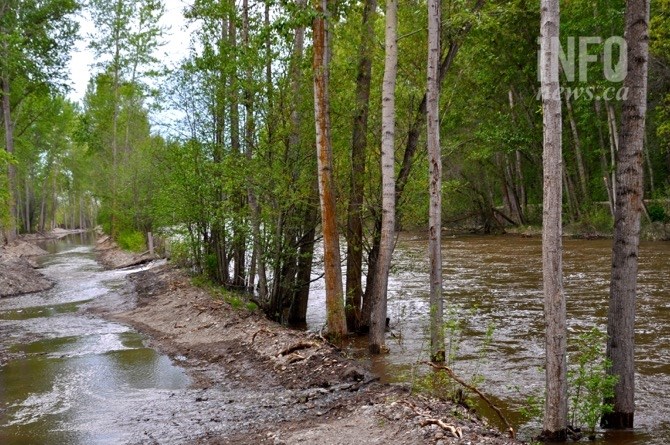
A lot has to happen before the City can get access to Mission Creek, seen here.
Image Credit: FILE PHOTO
March 02, 2017 - 11:30 AM
KELOWNA - If Kelowna gets a host of grants, the City’s new water plan has cleared the way to upgrade the water supply for customers of the Southeast Kelowna Irrigation District but future plans such as a new intake from Mission Creek for all city customers remain abstract concepts.
City Senior Engineer Ron Westlake says much more work must be done before the city capitalizes on the main cost-saving idea in the high-level planning report released Monday. It said using Mission Creek would save pumping and filtration costs over the current system which draws water upland from Okanagan Lake.
That's welcome news to some observers and participants in Kelowna’s water system wondering about impacts of drawing from the creek.
Dr. Anna Warwick-Sears of the Okanagan Basin Water Board says there’s still many questions about Mission Creek and how it interacts with ground water sources. Her team has been working with the Okanagan Nation Alliance to monitor water levels on the largest tributary to Okanagan Lake.
“At times of the year, there is a lot of water going through Mission Creek and other times of the year, there’s not a lot of water,” she says, and it can be like that from year to year as well. “I think that whoever is doing the engineering studies has to be looking at that dynamic. The long-term use of Mission Creek as a source just depends on having really good monitoring and good understanding of the system and fisheries biology on that.”
The report issued Monday, Feb. 27, is made further abstract with some assumptions about Mission Creek and how water is managed that have to be resolved first. The consultant was directed to not consider that the Black Mountain Irrigation District holds the vast majority of the water leases on the creek for irrigation so some of the findings — like saving $95 million over 25 to 50 years — should be taken with a grain of salt.
John Janmaat, UBCO research chair in water resources, says there isn’t enough water under licence left to create any cost savings for the City.
“Some sort of licencing gymnastics would have to be done to move forward,” he says. “The cost savings that are projected really rely on being able to use Mission Creek and if that cannot be true then costs savings will not be anywhere near as large as they suggest.”
To get water from Mission Creek will take plenty of negotiation with Black Mountain, which did not participate in the study. Calls to Black Mountain Irrigation District were not returned.
Black Mountain, like Rutland Waterworks and Glenmore-Ellison Irrigation District have resisted the City’s efforts to take over their assets, cash and lands, in part because they want to ensure the future of irrigation for agriculture.
The City envisions a future where drinking water and irrigation are separated entirely, leaving potentially more cost savings.
Janmaat says the irrigation districts have valid concerns about agriculture and says the issue of governance of the water systems must include governance and a place at the table.
“The City is not in the business of providing agricultural water,” he says. “The plan talks about separating agricultural supply from domestic supply, which makes sense. The question then is what the governance looks like with the different suppliers of water. If they set up a larger irrigation district that just supplies irrigation water to all areas of the city that need it and has a good reputation from agricultural water users, that could be a good thing. If the City tries to control the Irrigation District and domestic supply, then there is potential they wont really do a good job of serving agriculture…. It’s a big issue.”
Mayor Colin Basran says agriculture was one of the guiding principles of the document and sees no issue with the City managing irrigation.
“One of the guiding principles is that agricultural interests are maintained and given how important agriculture is in our community, why would we all of a sudden not care about it and not look after our agricultural ratepayers,” he says. “So for us to all of a sudden abandon them and have no thought for our agricultural industry is ridiculous.”
But the City’s aggression in pursuing the irrigation districts for takeover has created a rift. The City signed a water plan with the other districts in 2012 and two years later demanded it be renegotiated. That rift is why irrigation districts chose not to be included in this study — again, a critical hole in the plan.
Janmaat says taxpayers might have been better served — despite the stated savings — if the city took more time to ensure the agriculture partners were on board. Instead, he says it appears the City rushed through a 25 to 50 year plan to get expiring government grants.
“They could have done this better. When you look at these government funding programs they seem to occur every few years. So a mad rush to grab money out of this pot, well it’s not like it’s never going to be there again. And we are talking about infrastructure that is going to last 25 to 50 years, so maybe we shouldn’t be pushing things so fast.
To contact a reporter for this story, email Marshall Jones or call 250-718-2724 or email the editor. You can also submit photos, videos or news tips to the newsroom and be entered to win a monthly prize draw.
We welcome your comments and opinions on our stories but play nice. We won't censor or delete comments unless they contain off-topic statements or links, unnecessary vulgarity, false facts, spam or obviously fake profiles. If you have any concerns about what you see in comments, email the editor in the link above.
News from © iNFOnews, 2017